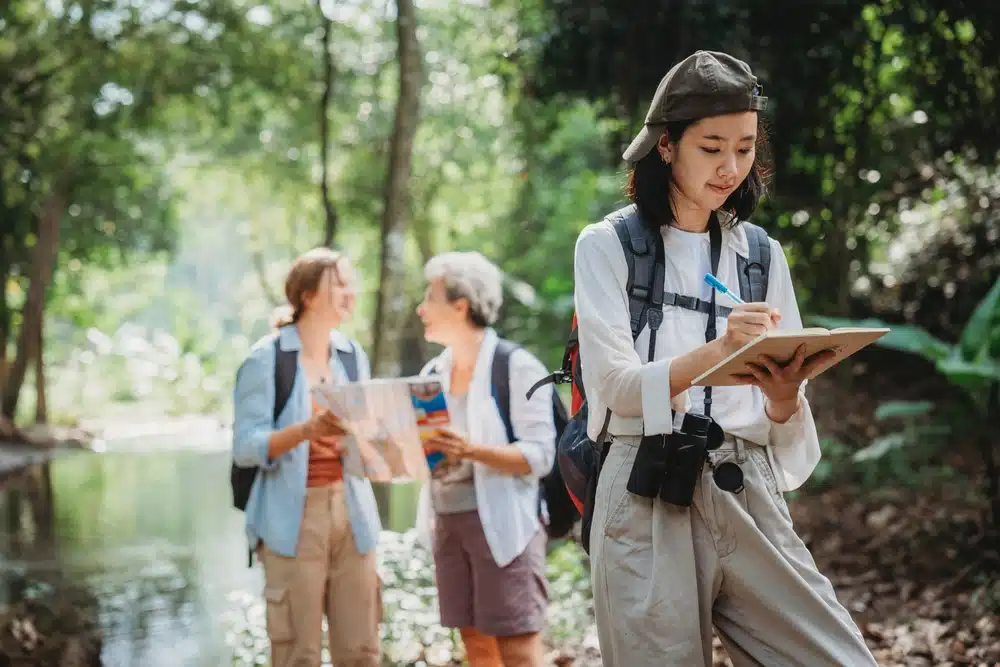Top 20 Archaeology Programs for High School Students
Discover the secrets to unlocking the past with our guide to the top programs for high school students in archaeology. If you’re on the waitlist, it’s crucial to know what steps to take next. This blog will navigate you through the top 20 archaeology opportunities tailored for eager young minds, ensuring you’re well-prepared to dig deeper into your passion.
Top 20 Archaeology Programs for High School Students
1. High School Field School at the Center for American Archaeology (CAA)
- Location: The German Site (11C377), IL
- Estimated Cost: 1 Week: $950, 2 Weeks: $1875, 3 Weeks: $2800, 4 Weeks: $3700
- Eligibility: Ages 13-17
- Important Dates: June 16-22 ( Week 1), June 23-29 (Week 2), June 30-July 6 (Week 3), July 7-13 (Week 4)
In Kampsville, students engage in both field and lab work alongside CAA archaeologists. They pick up excavation methods such as shoveling, troweling, mapping, measuring, soil analysis, and flotation sampling.
In the lab, students handle tasks like washing artifacts, identifying them, and performing flotation. This hands-on experience is enriched with evening lectures by CAA and guest archaeologists, covering a range of archaeological subjects. Evening outings might feature hikes and activities exploring ancient ways of life.
2. Roman Fortress Pulpon Field School
- Location: Carrascosa del Campo, Cuenca Spain
- Estimated Cost: $ 3,450
- Eligibility: High school students
- Important Dates: 1st session: June 10 – 26, 2024, 2nd session: June 27 – 13 July 2024
The Roman Fortress Pulpon Field School offers a hands-on archaeological experience at a significant Roman site in Spain. Students dive into field archaeology, Roman history, and Spanish culture, contributing to research that helps reconstruct Roman history in the Iberian Peninsula.
Working alongside professional archaeologists, they learn excavation methods and techniques. The fortress, visible from space, stands as one of Spain’s largest Roman remains, roughly the size of a soccer field. It surpasses the size of the Segóbriga forum and the Tarraco amphitheater, with its four corner towers making Pulpon an unparalleled archaeological site.
3. Boyd Archaeological Field School (Canada)
- Location: Claremont Nature Centre
- Estimated Cost: $2,900.00 + HST (must be a Canadian resident to apply)
- Eligibility: No older than 21
- Important Dates: August 9 to 25, 2024 (Program Dates)
At the Claremont Nature Centre, the Boyd Archaeological Field School provides students with a blend of classroom instruction and hands-on archaeological practice, focusing on both archaeology and indigenous history. Through on-the-job training, students acquire real archaeological skills.
The course is designed to push students to new heights of achievement within a collaborative team environment. They will participate in the excavation of an actual archaeological site and engage in hands-on activities like flintknapping, and exploring ancient technologies.
Alongside this practical experience, the academic aspect of the course is enriched with sessions led by certified teachers and professional archaeologists, including guest lectures from leading experts in the field. This integrated approach not only enhances their understanding of archaeology but also helps students make meaningful career and community connections.
4. Chicora Foundation, Inc.’s Archaeological Analysis – Detectives of the Past
- Location: Richland or Lexington counties
- Estimated Cost: $100/day (for schools in Richland, Lexington, Calhoun, Newberry, and Fairfield counties)
- Eligibility: Advanced 5th – 12th grades
- Important Dates: Not Specified
Small student teams analyze artifacts from a significant site in South Carolina, utilizing resources to deduce the site’s county, town, time period, and function, as well as its importance to South Carolina history. Through this analytical process, teams compete to accurately identify these aspects, deepening their understanding of the region’s archaeological and historical significance.
5. Archaeology Summer Scholars Session at the University of Notre Dame
- Location: Notre Dame, IN
- Estimated Cost: $4,725
- Eligibility: Rising juniors and seniors
- Important Dates: Session I Program Dates: June 8 – 22, 2024, Session II Program Dates: June 29 – July 13, 2024
The program integrates archaeological fieldwork, classroom study, and lab work, focusing on Notre Dame’s campus and its historical layers, including early American and Native American histories. Students will investigate the Old College site, uncovering evidence from the university’s founding and earlier periods. The course aims to provide a thorough understanding of archaeological methods, campus resources, communication skills for sharing findings, and insights into career opportunities in archaeology.
6. UMass Amherst Pre-College Program – Forensic Anthropology and Bioarchaeology
- Location: UMass Amherst campus
- Estimated Cost: $3,635 (Residential), $2,167 (Commuter)
- Eligibility: Rising sophomore to Senior
- Important Dates: July 28 – August 10, 2024 (Program Dates)
This program demonstrates how biological anthropology is applied in legal contexts and historical research. Participants will gain knowledge in forensic death investigation, skeletal biology, entomology, and forensic science techniques.
The curriculum includes daily lab sessions where students interact with plastic skeletal models to identify bones and detect trauma or disease signs. The course covers the protocols for collecting skeletal remains at crime scenes or archaeological digs, addressing the ethical considerations of handling human remains.
At the end of the program, students will engage in a simulated crime scene investigation, applying learned techniques to process and analyze evidence, providing a practical and integrative experience in forensic anthropology and bioarchaeology.
7. Anson L. Clark Scholars Program
- Location: Texas Tech University
- Estimated Cost: Not Specified
- Eligibility: At least 17 years old
- Important Dates: June 16, 2024 to August 1, 2024 (Program Dates)
This program offers an in-depth exploration of modern American history with a focus on political developments, particularly the rise of conservatism and the unique political culture of the Sunbelt region, encompassing Texas and the broader fusion of Southern and Western influences post-1945.
Participants will study the historical contexts and dynamics that have shaped contemporary American politics, examining the interplay between regional identities and national trends. Through this lens, the course provides a comprehensive understanding of the pivotal shifts in American political history, emphasizing the significant role of the Sunbelt in shaping modern political discourse.
8. American Foreign Academic Research (AFAR) Pre-Collegiate Archaeological Experiences
- Location: Belize, Spain, Portugal or Greece
- Estimated Cost: Not Specified
- Eligibility: Grades 7-12
- Important Dates: Not Specified
AFAR is committed to advancing archaeological field research and cultural site preservation. It emphasizes the importance of both professional and non-professional contributions to the field. AFAR offers pre-collegiate students unique opportunities to engage directly with archaeology through hands-on excavations and participation in world-class seminars, particularly at its Maya conferences.
Students have the chance to work on significant archaeological sites across the globe, including Mayan sites in Belize, Medieval sites in Spain, Roman sites in Portugal, and ancient Greek sites in Greece, providing them with a diverse and enriching educational experience in the field of archaeology.
9. Colonial Williamsburg Public Archaeology Institute
- Location: Williamsburg, VA
- Estimated Cost: Free of charge
- Eligibility: Grades 9-12
- Important Dates: June 17-21, 2024 (Session 1), July 8-12, 2024 (Session 2)
The 2024 Public Archaeology Institute (PAI) offers a distinctive opportunity for students to engage directly in archaeological practice alongside professionals, merging documentary and archaeological evidence to craft cohesive historical narratives for public education.
Participants will delve into the history of Custis Square and Williamsburg’s Public Hospital, analyzing various artifact types such as ceramics, architectural materials, faunal remains, and small finds during eight hours of classroom instruction. The program emphasizes practical learning, with students spending most of the week in the field, honing archaeological techniques, documenting sites, and interpreting data.
They will also interact with the public, enhancing their communication skills. The experience culminates in student-led site tours, where participants present their findings and insights, connecting the site’s past with present research goals to visitors, family, and friends.
10. New York Historical Society Student Historian Internship Program
- Location: New-York Historical Society
- Estimated Cost: Not Specified
- Eligibility: Grades 10-12
- Important Dates: July 9, 2024 – August 15, 2024 (Program Dates)
The Student Historians internship at the New-York Historical Society offers students the chance to become immersed in historical research and digital project creation. Interns utilize the Society’s extensive resources to explore and convey their findings on the theme “Our Composite Nation: Frederick Douglass’ America.”
Through meetings with professional staff, they gain insights into museum, library, digital humanities, and historical research practices. Collaborating with peers, interns enhance their skills in historical analysis, communication, and digital media, undertaking hands-on tasks that deepen their grasp of American history and digital humanities concepts. This program fosters a comprehensive educational experience, blending historical inquiry with modern digital storytelling techniques.
11. Fort St. Joseph Archaeology Project at the Western Michigan University
- Location: Niles, MI
- Estimated Cost: Not Specified
- Eligibility: Grades 6-12
- Important Dates: July 16-19 (Experienced Learners), July 22-26 (Grades 6-12), July 29-August 2 (Lifelong Learners and Educators)
The Fort St. Joseph Archaeology Summer Camp Program, a collaborative effort by Western Michigan University and the City of Niles, invites the public to look into the history and archaeology of Fort St. Joseph, an 18th-century site that served as a mission, garrison, and trading post.
Participants will study archaeology and the fort’s history at the Niles District Library, engage in laboratory activities, and take part in actual excavation work on-site, guided by experienced WMU archaeologists and field school students. This program offers a hands-on historical exploration, providing a unique educational experience for high school students in archaeology.
12. Internships at the Fairfield Foundation
- Location: Gloucester, Virginia
- Estimated Cost: $175/week
- Eligibility: 16 or older
- Important Dates: Internships are scheduled primarily between mid-May and mid-August.
The Fairfield Foundation, a nonprofit dedicated to archaeological research, historic preservation, and public outreach in Virginia’s Middle Peninsula, focuses primarily on the Burwell plantation in Gloucester County, also known as Fairfield or Carter’s Creek. Since 2000, the foundation has conducted comprehensive studies of the colonial plantation, emphasizing how slavery influenced the landscape.
Collaborating with interns and volunteers, the foundation examines the history of all the site’s inhabitants, including Native Americans present before Jamestown’s settlement and the enslaved and free African Americans who worked the land for nearly three centuries.
The foundation’s interdisciplinary team, comprising archaeologists, historians, and specialists in laboratory and material culture, employs a blend of documentary research, fieldwork, and public programs to deepen understanding of the site’s historical significance within the Atlantic World.
- Location: Montpelier, VT
- Estimated Cost: $950
- Eligibility: Rising high school juniors, seniors, and rising undergraduates
- Important Dates: July 7 – 12, 2024
This program offers a week-long, immersive introduction to archaeology, where participants work alongside professional archaeologists on actual research sites within the Montpelier property. The program caters to a diverse group, including young students, high school juniors and seniors, and rising undergraduates, providing an ideal exploration of archaeology as a potential career path.
The 2024 excavation season will concentrate on the Archaeology of Memorialization, specifically aiming to delineate the Montpelier Burial Ground of the Enslaved and enhance understanding of how this site was honored by the descendant community. In collaboration with the Montpelier Descendants Committee (MDC), the program integrates surveys and excavations to contribute to the creation of a memorial, recognizing the legacy of the ancestors buried there.
Students participating in the excavation will engage in meaningful work, helping to uncover the burial ground’s extent, investigating how the site was commemorated, and aiding in the restoration of the landscape to honor those interred, aligning with broader objectives of memorialization and respect for the site’s historical and cultural significance.
14. Community Archaeology Program at Binghamton University (SUNY)
- Location: TBD
- Estimated Cost: $250
- Eligibility: Grades 7-10 (For Teens)
- Important Dates: July 8th-12th, 2024 (Program Dates)
The Community Archaeology Program (CAP) serves as the public engagement arm of the Public Archaeology Facility (PAF) at Binghamton University, providing a gateway for the community to discover the world of archaeology directly from professionals in the field.
CAP annually presents outreach initiatives tailored to the public’s interest, enabling participants to delve into archaeological practices, findings, and their implications, thus fostering a deeper connection with the past through informed and interactive learning experiences.
Students involved in CAP will engage in experimental archaeology, learn in-depth survey and mapping techniques, and participate in other activities specifically designed for their age group, enriching their understanding and hands-on experience in the field.
15. National Park Service (NPS) Youth Archaeology Expeditions
- Location: Mosca, CO
- Estimated Cost: Not Specified
- Eligibility: Ages 11-17
- Important Dates: July 7 – August 4, 2024 (Program Dates)
The Great Sand Dunes National Park and Preserve’s Education Team is excited to offer the San Luis Valley Archaeological Expeditions, educational programs designed for local youth aged 11-17, with family participation encouraged. This series includes interactive sessions at different locations: discovering rock art at Rio Grande County Museum, exploring the historical diversity and Ute scientific practices at Fort Garland Museum & Cultural Center, and engaging in hands-on archaeological activities at Great Sand Dunes National Park and Preserve. These programs, scheduled throughout July and August, aim to provide a comprehensive and engaging learning experience about the valley’s rich history and archaeological heritage.
16. Summer Field School in Historical Archaeology
- Location: Lynchburg, VA
- Estimated Cost: $1,368 (Undergraduate), $1,605 (Graduate)
- Eligibility: Graduate and undergraduate students in Anthropology
- Important Dates: June 3- July 12, 2024 (Program Dates)
The 33rd annual Summer Field School in Historical Archaeology, hosted by Thomas Jefferson’s Poplar Forest and the University of Virginia, offers hands-on training in archaeological methods and theory. Participants will investigate the lives of enslaved residents and the early infrastructure of Poplar Forest through excavation and analysis.
The 2024 field school focuses on uncovering and studying historical structures, including a brick quarter from the 1850s. This work aims to enhance understanding of the plantation’s history and improve its presentation to the public.
17. Oakland University Midwest Archaeological Field School (MAFS)
- Location: Rochester, MI
- Estimated Cost: Not Specified
- Eligibility: High school students
- Important Dates: 11 May-23 June 2023 (Program Dates)
The Oakland University Midwest Archaeological Field School 2022 teaches students comprehensive archaeological methods, including pre-field historical and environmental research, archaeological survey and excavation, artifact identification, and laboratory processing.
Participants will survey several local areas with potential for both historic and prehistoric archaeological sites. Oakland University collaborates with local school districts, providing access to archaeological field training that integrates practical research experience with environmental and social sciences.
18. Kutztown University’s Archaeology Field School
- Location: Kutztown, PA
- Estimated Cost: Not Specified
- Eligibility: Students who have taken courses in archaeology and related social and natural sciences will be valuable contributors.
- Important Dates: Summer 2025
Kutztown University’s archaeology field school is an annual summer program where students engage in hands-on archaeology, uncovering the history of eastern Pennsylvania’s inhabitants from centuries ago. Previous excavations have centered on Stoddartsville, an early-nineteenth-century milling village in northeast Pennsylvania; Joanna Furnace, a nineteenth-century ironworks in southeast Pennsylvania; and the KU Site, a prehistoric site on Kutztown University’s campus.
19. Bard Archaeology Field School
- Location: Germantown, NY
- Estimated Cost: $1,700
- Eligibility: Grades 9–12, graduate students
- Important Dates: June 26 – July 14 (Program Dates)
The Bard Archaeology Field School is a summer program where students engage in field research for college credit. The research focuses on the descendants of the 1710 Palatine German immigrants and their African American neighbors. Excavations take place at the 1746 Parsonage in Germantown, which has served various roles throughout history, from a minister’s residence to housing non-church families.
The program offers access to 15 online exhibits featuring interactive maps, virtual displays, videos, and slide shows. The Parsonage’s history includes transitions in ownership from German Reformed ministers to local families and African American farmer Henry Person, reflecting the area’s diverse cultural heritage. In 1944, German-American preservationists acquired and restored the house, later bequeathed to the town, with Bard College initiating excavations in 2009.
20. Rice University’s Online Archaeology Certificate Program
- Location: Online
- Estimated Cost: $49/month
- Eligibility: Advanced high school, college students, or lifelong learners
- Important Dates: N/A
Rice University’s Introduction to Archaeology specialization is an online program that offers an in-depth look into basic archaeological principles. This four-course series covers scientific methods, interpretation models, and critical concepts in archaeology, also delving into the subject’s significant societal impact. Participants will gain firsthand knowledge of the field’s most engaging contemporary debates, enhancing their understanding of how archaeology contributes to our grasp of history and modern life.
How to Find the Best Archaeology Programs for You?
Identify Your Interests and Goals
Start by reflecting on what specific aspects of archaeology fascinate you the most, such as prehistoric archaeology, Egyptology, or forensic archaeology. Consider your long-term career objectives and how they align with these interests. This initial step is crucial as it sets the foundation for your search, ensuring you choose a program captivates you and propels you toward your desired career path.
Research Accredited Institutions
Focus on universities that are accredited, as this status indicates adherence to quality standards in education. Investigate both well-known and lesser-known institutions for archaeology programs that welcome high school students, as sometimes smaller or less famous schools can offer unique opportunities that might align perfectly with your interests. Accreditation is a hallmark of credibility and quality, assuring you of a valuable educational experience.
Examine Faculty Expertise and Research Opportunities
Do some research on the qualifications and research areas of the faculty members in potential programs. Look for faculty whose interests align with yours and who are actively engaged in research, as this can enhance your learning experience and open up opportunities for mentorship and collaboration. Research opportunities, whether in the field or the lab, are pivotal for hands-on experience, enabling you to apply theoretical knowledge in practical settings.
Consider the Program’s Curriculum and Specialization Options
Analyze the curriculum to ensure it covers the breadth of archaeology, including theory, methods, and specific regions or periods that interest you. Programs that offer flexibility or specializations can be particularly beneficial, allowing you to tailor your studies to your interests. Moreover, a diverse curriculum can provide a comprehensive understanding of the field, preparing you for various career paths.
Look at Alumni Outcomes
Researching the trajectories of a program’s alumni can offer insights into the program’s effectiveness and the opportunities it might open for you. If many alumni have progressed to successful careers in archaeology or related fields, it’s a good indication of the program’s quality and networking opportunities. This step is about envisioning your future and ensuring the archaeology programs can help you achieve your career aspirations, even if you are still in high school.
Evaluate Location and Resources
The geographical location of the institution can significantly impact your academic and practical experience in archaeology. An institution located near archaeological sites or with strong ties to museums and research institutions can provide practical learning opportunities. The availability of resources such as specialized libraries and laboratories is essential for supporting your studies and research.
Check Financial Aid and Scholarships
Understanding the financial aspect of your education is crucial. Investigate the availability of financial support such as scholarships, grants, and assistantships, which can alleviate the financial burden and allow you to focus more on your studies and research. Financial aid can also reflect a program’s commitment to supporting its students.
Visit the Campus
Visiting the campus can give you a tangible sense of the program and its environment. During your visit, try to attend a class or seminar, which can provide deeper insights into the teaching style and academic atmosphere. Engaging with the academic community in person can significantly influence your decision, helping you choose a program where you feel you can thrive.
Read Reviews and Speak with Alumni
Seeking out reviews and firsthand accounts from alumni can provide an unfiltered perspective on the archaeology programs for high school students’ strengths and weaknesses. Conversations with former students can reveal the program’s impact on their career development and personal growth. This feedback can be invaluable in making an informed decision, ensuring the program aligns with both your academic and professional expectations.
Consider Post-Graduation Opportunities
Finally, consider the career services and alumni network of the program. A strong alumni network and effective career services can greatly enhance your employment prospects post-graduation. The right program should not only offer a robust academic foundation but also support your transition into the professional world, helping you to establish a successful career in archaeology or related fields.
These enhanced steps provide a more comprehensive guide to finding an archaeology program that will meet your academic and professional needs, ensuring a fulfilling and enriching educational experience.
How Can Participants Benefit from Attending Archaeology Programs for High School Students?
Attending archaeology programs for high school students offers early exposure to the field, helping participants decide if they wish to pursue archaeology or related disciplines. These programs often include hands-on fieldwork, providing practical experience, and teaching essential archaeological techniques. This early engagement can enhance a student’s academic profile, showcasing their dedication to the subject, which is beneficial during college admissions.
Participants also develop valuable transferable skills such as critical thinking, analytical reasoning, and teamwork. Networking opportunities with professionals and peers alike can open doors for future academic and career prospects, while the study of diverse cultures and histories fosters cultural appreciation and sensitivity.
These programs clarify potential career paths within archaeology, aiding students in making informed educational and career choices. Beyond academic and career benefits, these programs offer personal fulfillment, allowing students to deeply explore their interests in archaeology and history, potentially sparking a lifelong passion in the field.
How Does Participation in Archaeology Programs for High School Students Impact College Admissions?
Participation in archaeology programs can positively impact your college admissions. These programs show your deep interest in a subject. They also highlight your willingness to explore it beyond the classroom. When you apply to college, admissions officers look for this kind of initiative. They value students who seek out learning opportunities.
Taking part in these programs helps you stand out. You gain unique experiences and skills. For example, if you’ve done fieldwork, you have hands-on experience that other applicants might not have. This can make your application more compelling.
These programs often offer chances to work with experts in the field. This networking can lead to strong recommendation letters. Such letters provide insight into your work ethic and passion.
Being part of archaeology programs can boost your college application. It shows commitment, hands-on experience, and a proactive approach to learning. All these factors can impress admissions officers and enhance your chances of getting into a good college.
Final Thoughts
Participating in high school archaeology programs can significantly enhance your college application. It demonstrates your dedication to learning and provides practical experience that sets you apart from other applicants.
By showing your proactive engagement in archaeology, you not only enrich your academic profile but also pave the way for a promising future in higher education. Remember, in the competitive world of college admissions, every unique experience counts towards shaping your path to success.
















































